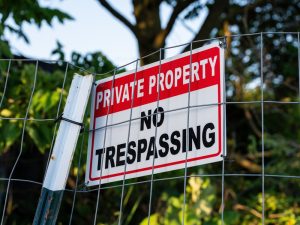Legal Blog
House Bill 984 – Removal of Squatters from Private Property
 There was a viral sound/video clip that was circulating around social media sometime last year where a woman walks into what is presumed to be her house to find someone in her living room. She proceeds to ask the individual, “Who are you?” The individual responds by saying, “I’m Pam; who are you?” The woman then responds, saying, “I’m the owner of this house.” Anytime I come across a new article concerning squatters, this viral sound/video clip immediately pops into my head. Earlier last year, I addressed squatters in a blog post and the growing issues homeowners and landlords were facing regarding their vacant properties and squatters. When it comes to landlord-tenant law, one could argue that there aren’t many grey areas, but if there are any, squatters and squatters’ rights are definitely one, especially here in North Carolina. To many, squatters are a criminal issue as they are, in fact, trespassing; however, police, when called, often tell homeowners and landlords it’s a civil issue and that the squatter(s) will have to be evicted if they have been there for an extended period of time. However, filing a complaint in summary ejectment requires a landlord-tenant relationship, which is not present if the individual is squatting. So, landlords and homeowners are left with few options and little guidance as there are currently no laws that directly address this issue.
There was a viral sound/video clip that was circulating around social media sometime last year where a woman walks into what is presumed to be her house to find someone in her living room. She proceeds to ask the individual, “Who are you?” The individual responds by saying, “I’m Pam; who are you?” The woman then responds, saying, “I’m the owner of this house.” Anytime I come across a new article concerning squatters, this viral sound/video clip immediately pops into my head. Earlier last year, I addressed squatters in a blog post and the growing issues homeowners and landlords were facing regarding their vacant properties and squatters. When it comes to landlord-tenant law, one could argue that there aren’t many grey areas, but if there are any, squatters and squatters’ rights are definitely one, especially here in North Carolina. To many, squatters are a criminal issue as they are, in fact, trespassing; however, police, when called, often tell homeowners and landlords it’s a civil issue and that the squatter(s) will have to be evicted if they have been there for an extended period of time. However, filing a complaint in summary ejectment requires a landlord-tenant relationship, which is not present if the individual is squatting. So, landlords and homeowners are left with few options and little guidance as there are currently no laws that directly address this issue.
Enter House Bill 984. House Bill 984 enacts a new article (Article 8) to be added to the North Carolina General Statute, Chapter 42. If passed, the bill would allow for the expedited removal of unauthorized persons from residential property. Property owners (or authorized agents) will be able to request that law enforcement removal person(s) unlawfully occupying the property if: (1) the requesting party is the property owner or an authorized agent of the property owner; (2) the property that is being occupied is a residential dwelling or property used in connection with a residential dwelling or is real property appurtenant to a residential dwelling, (3) an unauthorized person or persons have unlawfully entered and remain on or continue to reside in the private property, (4) the private property was not offered or intended as an accommodation for the general public at the time the unauthorized person entered, (5) the property owner or the authorized agent of the property owner has directed the unauthorized person or persons to leave the property, (6) the unauthorized person or persons are not tenants as defined in GS 42-59, (7) there is no pending litigation between the property owner and the unauthorized person or persons related to the residential property, and (8) no other valid rental agreement has been entered into or formed by the property owner and the unauthorized person or persons allowing them to occupy the private property.
Property owners would complete an effective removal complaint form and submit it to the municipal police department, or with the county sheriff’s office or county police department (all depending on where the property is located). After verifying the complaint, law enforcement will have 48 hours to remove the unauthorized person(s) from the private property. If passed, this law would become effective October 1, 2024.
I know with the passage of this law, property owners would be able to breath a huge sigh of relief. This bill would also help to curtail squatters as they may think twice about squatting, given the likelihood of them being arrested and charged would nearly be a guarantee.
On June 6, 2024, House Bill 984 was referred to the Committee on Rules, Calendar, and Operations of the House and seems to be gaining traction.
In the meantime, if you are a property owner with vacant properties you should routinely check your properties, have no trespassing signs conspicuously posted all around the property, and make sure the property is secured.
Below, please find a link to House Bill 984:
House Bill 984 (2023-2024 Session) – North Carolina General Assembly (ncleg.gov)
Sign-Up for the Landlord Tenant Monthly Connection
ABOUT AKYSIA RESPER
 akysia.resper@offitkurman.com | 704.716.0827
akysia.resper@offitkurman.com | 704.716.0827
Akysia Resper is an attorney in the firm’s Landlord Representation practice. Ms. Resper represents and advises her clients in matters involving civil litigation with an emphasis in landlord-tenant and real estate matters. She understands that certain aspects of the legal process can be intimidating and takes pride in being an advocate for her clients, helping defend and protect their rights, interests, and assets.
